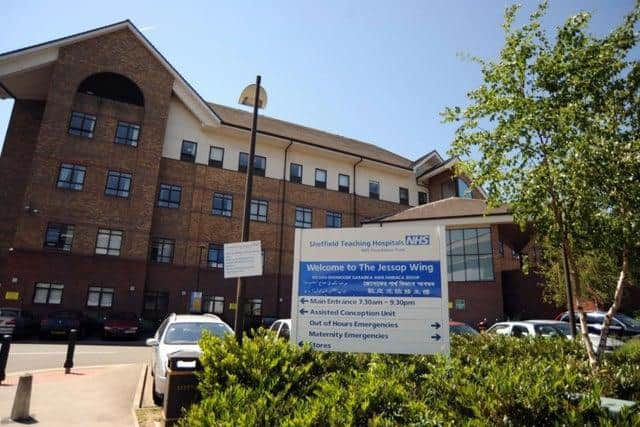CQC takes urgent action over concerns for pregnant women’s safety at Jessop Wing
and live on Freeview channel 276
Following the inspection, which began in March, the regulatory body has imposed ‘urgent conditions’ on the trust requiring them to take action to ensure the safety of patients, and to regularly report to CQC on the progress made.
Sheffield Teaching Hospitals NHS Foundation Trust has stressed that, since the initial findings of the report on March 12, a number of measures have already been implemented to improve the services, and has reassured patients that their safety is paramount.
Advertisement
Hide AdAdvertisement
Hide AdThe inspection in March was prompted following concerns about the safety and quality of services being provided to women and babies.


Inspectors visited the labour ward, two postnatal wards, antenatal ward, admission triage area and the advanced obstetric care unit.
They also spoke to staff and observed them providing care and treatment to patients.
The service was rated ‘inadequate’ for being safe and well-led and ‘requires improvement’ for being effective. Responsive and caring were not rated at this inspection.


Advertisement
Hide AdAdvertisement
Hide AdFindings from the inspection included a lack of effective systems to ensure staff had the skills, competence, knowledge and experience to safely care for women and their babies.
The CQC said there was a shortage of midwives on wards and highlighted failures to properly investigate and learn from safety incidents. This included failure to report deaths of mothers as a serious incident.
The report said that the trust had reported five deaths of women between October 2019 and December 2020, but only three were reported as serious incidents and investigated.
The trust also did not have effective systems in place for managing and responding to patient risk in line with national guidance.
Advertisement
Hide AdAdvertisement
Hide AdStaff did not always complete and update risk assessments for each patient and patient safety incidents were not always managed well, the CQC added.
The watchdog said at times mothers were prioritised not based on risk, but on what time they turned up at Jessop Wing.
Important equipment was not tested regularly enough, and abduction drills were not carried out, according to the report.
Sarah Dronsfield, CQC’s head of hospital inspection, said: “When we visited maternity services in the Jessop Wing at Sheffield Teaching Hospitals NHS Foundation Trust, inspectors found a service that was not providing the standard of care women should be able to expect.
Advertisement
Hide AdAdvertisement
Hide Ad"Our findings were such that the ratings for maternity services across the trust have moved from outstanding to inadequate.
“Due to the concerns we found that needed addressing as a priority, we have imposed urgent conditions on the trust’s registration which require immediate action in order to make sure people receive the care they are entitled to."
Responding to the findings, Sheffield Teaching Hospitals says it has been quick to implement change and has assured women coming in for treatment that they will receive ‘safe, good care’.
The Trust also pointed out that CQC Inspectors found a number of areas of good practice within the maternity service and felt staff were focused on the needs of the women receiving care.
Advertisement
Hide AdAdvertisement
Hide AdKirsten Major, Chief Executive, Sheffield Teaching Hospitals NHS Foundation Trust said: “I want to assure women coming into the Jessop Wing to have their babies that our maternity teams work incredibly hard every day to ensure their care is always the number one priority.
“Whilst we are exceptionally disappointed with the findings of the CQC report, we welcome the external scrutiny and have wasted no time in responding to the actions which have been identified as necessary.
"Many of the actions have been completed in the three months since the inspection took place.
"For example, our governance and risk processes are being overhauled including how we learn from incidents and respond to data collected nationally and locally.
Advertisement
Hide AdAdvertisement
Hide Ad"Elements of our assessment process needed further review which we have done and whilst our midwifery staffing levels have not declined, we are taking on board what the CQC has said and have already recruited 30 new midwives to ensure we continue to deliver the care women have come to expect from the Jessop Wing.
"We clearly have some improvements to make but we are encouraged by the feedback from families who use the service which is very positive and reflects the commitment of our staff to provide good care and more often than not go above and beyond what is required of them.”
The CQC’s Ms Dronsfield also highlighted positives found during the report.
She said: “We also found some areas of good practice and a culture where staff felt respected, valued and supported. Staff were caring and focused on the needs of the women receiving care, and the service also promoted equality and diversity in daily work.
Advertisement
Hide AdAdvertisement
Hide Ad“Following the inspection, the trust has provided an action plan detailing what they are doing to reduce these risks and we have discussed the first stages of the improvements the trust has taken. We continue to monitor the trust extremely closely and expect them to continue to make rapid improvements.
“The trust leadership team know what they must do to improve patient safety and we will re-inspect to ensure this happens, taking further action if needed to protect patients.”
Professor Chris Morley, Chief Nurse, Sheffield Teaching Hospitals NHS Foundation Trust added: “Whilst there is a focus quite rightly on what we need to improve I am also pleased that the inspectors found several areas of good practice and most importantly they recognised that Jessop Wing colleagues were focused on the needs of the women receiving care and that doctors, midwives and other healthcare professionals were working together as a team to benefit families.
"If any women or their partners have concerns following this inspection, then please do not hesitate to contact us and the team will be happy to provide assurance.”
Advertisement
Hide AdAdvertisement
Hide AdPhoebe Pallotti, board member for the Sheffield Maternity Cooperative, associate professor of midwifery and practising midwife, who previously worked at Jessop Wing, offered analysis of the CQC findings and what comes next.
She said: "The Sheffield Maternity Cooperative supports our midwifery colleagues at the Jessop Wing, especially during this pandemic when the situation has been particularly difficult for all health care professionals.
"There are many caring, expert and dedicated midwives working here. However, the CQC report very much reflects what we have been hearing in the experience of Sheffield families and we would welcome the opportunity to work more closely with the Jessop Wing to support excellent maternity care in our city.
"In particular, we believe that the Midwifery Led Unit, which research has conclusively shown to be the safest place for most women to give birth, continues to be funded for core staff - which is at the moment in jeopardy.”
Advertisement
Hide AdAdvertisement
Hide AdOn a national level, the CQC has called for continuity schemes to be implemented in maternity units – ensuring that women see the same midwife throughout the pregnancy and labour.
This requires the recruitment of more midwives, as Sheffield Teaching Hospitals has said it has done.
Professor Pallotti added: "We also hope that the new continuity schemes, whilst very welcome in principle, are able to give families a chance to have a relationship with one midwife, rather than seeing a different midwife at every appointment which seems to be the outcome of the scheme for many at the moment.
"Again, the research shows that antenatal and labour continuity of care is the safest option.
Advertisement
Hide AdAdvertisement
Hide Ad"We believe that the wellbeing of midwives also needs to be a priority, with good emotional support, adequate staffing and a 'just culture' risk reporting and safety implementation structure as set out by NHS England.
"These are challenging times in healthcare and we hope that innovative and family centred birth care will be included in the changes which will inevitably be made as a result of the new CQC Inadequate rating, including closer working with local non-NHS maternity groups as recommended in the Better Births report 2016."
Midwives working at Jessop Wing, who wish to remain anonymous, say that the CQC was tipped off by concerned employees at the unit, prompting the unannounced inspection.
One midwife told The Star: “CQC have put Jessop Wing into special measures and are sending an independent team to monitor its management. Serious safety concerns [...] from a very sad midwife, who has seen maternity care deteriorate rapidly over the last few years.”
Advertisement
Hide AdAdvertisement
Hide AdAnd another said: “Staff have recently been told that as a result of the CQC visit they must have "better systems in place", "learn from things that have gone wrong" and ensure that the triage system on labour ward prioritises women correctly.
"It was suggested that these are national issues and every maternity unit in the country is being required to do this.”